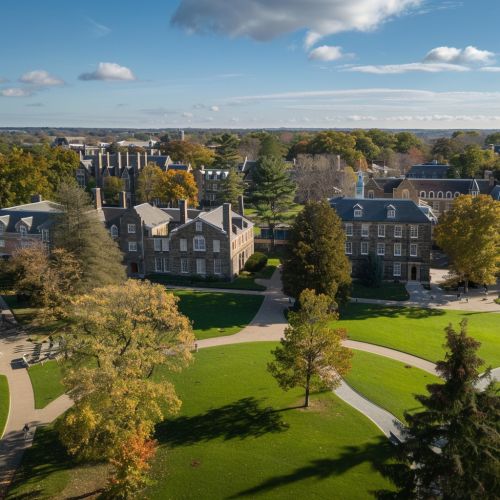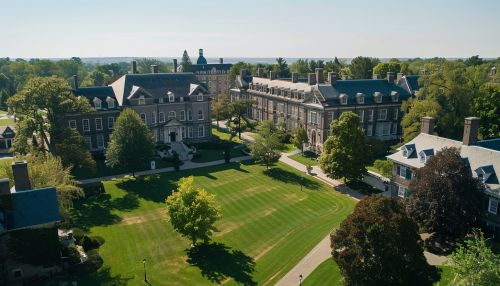Quaker colleges and universities
Overview
Quaker colleges and universities are institutions of higher learning that are affiliated with the Religious Society of Friends, commonly known as Quakers. These institutions are characterized by their commitment to the Quaker principles of simplicity, peace, integrity, community, equality, and stewardship. Quaker educational institutions aim to provide a holistic education that nurtures both the intellectual and moral development of students.
Historical Background
The establishment of Quaker colleges and universities dates back to the 17th and 18th centuries, when Quakers sought to create educational environments that aligned with their religious values. The first Quaker schools were founded in England, but the movement quickly spread to the American colonies. Early Quaker educational institutions were often coeducational and emphasized practical skills alongside academic subjects.
Notable Quaker Colleges and Universities
Haverford College
Haverford College, located in Haverford, Pennsylvania, is one of the oldest and most prestigious Quaker colleges in the United States. Founded in 1833, Haverford is known for its rigorous academic programs and strong commitment to social justice and community service. The college offers a wide range of undergraduate programs and has a student body of approximately 1,300 students.


Swarthmore College
Swarthmore College, also located in Pennsylvania, was founded in 1864 by a group of prominent Quakers. Swarthmore is renowned for its liberal arts curriculum and its Honors Program, which allows students to engage in independent research and interdisciplinary studies. The college has a student body of around 1,600 and offers a variety of undergraduate programs.
Earlham College
Earlham College, located in Richmond, Indiana, was founded in 1847. Earlham is known for its strong emphasis on international education and social responsibility. The college offers a range of undergraduate and graduate programs and has a student body of approximately 1,000 students. Earlham's curriculum is designed to foster critical thinking, ethical decision-making, and global awareness.
Educational Philosophy
Quaker colleges and universities are guided by the principles of the Quaker faith. These principles are often referred to as the "SPICES": Simplicity, Peace, Integrity, Community, Equality, and Stewardship. The educational philosophy of Quaker institutions emphasizes the development of the whole person, including intellectual, moral, and spiritual growth.
Simplicity
Simplicity in Quaker education involves focusing on what is essential and avoiding unnecessary complexity. This principle is reflected in the minimalist design of campuses and the straightforward approach to teaching and learning.
Peace
The principle of peace is central to Quaker education. Quaker colleges and universities often have strong programs in peace and conflict studies, and they encourage students to engage in activities that promote social justice and nonviolence.
Integrity
Integrity involves being honest and truthful in all aspects of life. Quaker institutions emphasize academic honesty and ethical behavior, and they encourage students to act with integrity in their personal and professional lives.
Community
Community is a core value in Quaker education. Quaker colleges and universities foster a sense of community through small class sizes, collaborative learning environments, and a strong emphasis on service and civic engagement.
Equality
Equality is a fundamental Quaker principle that informs the policies and practices of Quaker educational institutions. Quaker colleges and universities strive to create inclusive environments where all students are valued and respected.
Stewardship
Stewardship involves taking care of the resources entrusted to us, including the environment. Quaker colleges and universities often have strong sustainability programs and initiatives aimed at reducing their environmental impact.
Academic Programs
Quaker colleges and universities offer a wide range of academic programs, including liberal arts, sciences, social sciences, and professional studies. Many Quaker institutions have strong programs in areas that align with Quaker values, such as peace and conflict studies, environmental science, and social justice.
Undergraduate Programs
Undergraduate programs at Quaker colleges and universities are designed to provide a well-rounded education that prepares students for a variety of careers and further study. These programs often include a strong liberal arts core, with opportunities for interdisciplinary study and independent research.
Graduate Programs
Some Quaker colleges and universities also offer graduate programs in areas such as education, business, and social work. These programs are designed to provide advanced training and professional development for students seeking to make a positive impact in their communities and professions.
Campus Life
Campus life at Quaker colleges and universities is characterized by a strong sense of community and a commitment to social responsibility. Students are encouraged to participate in a variety of extracurricular activities, including student government, service organizations, and cultural and recreational clubs.
Residential Life
Many Quaker colleges and universities have residential campuses, where students live in dormitories or other on-campus housing. Residential life is designed to foster a sense of community and provide opportunities for personal and social development.
Student Organizations
Student organizations at Quaker colleges and universities reflect the diverse interests and values of the student body. These organizations often include service groups, environmental clubs, and cultural organizations, as well as academic and professional societies.
Athletics
Athletics are an important part of campus life at many Quaker colleges and universities. These institutions often have strong athletic programs and facilities, and they encourage students to participate in sports and physical activities as part of a balanced lifestyle.
Notable Alumni
Quaker colleges and universities have produced many notable alumni who have made significant contributions in a variety of fields. These alumni include leaders in government, business, education, and the arts, as well as activists and social reformers.
Rufus Jones
Rufus Jones was a prominent Quaker theologian and philosopher who graduated from Haverford College. He was a key figure in the development of modern Quaker thought and played a significant role in the establishment of the American Friends Service Committee.
Alice Paul
Alice Paul, a graduate of Swarthmore College, was a leading figure in the women's suffrage movement in the United States. She played a key role in the passage of the Nineteenth Amendment, which granted women the right to vote.
Bayard Rustin
Bayard Rustin, an alumnus of Wilberforce University, was a civil rights activist and a key advisor to Martin Luther King Jr. Rustin was instrumental in organizing the 1963 March on Washington and was a strong advocate for nonviolent resistance.
Challenges and Opportunities
Quaker colleges and universities face a number of challenges and opportunities in the modern educational landscape. These institutions must navigate issues such as financial sustainability, changing student demographics, and the evolving needs of the workforce.
Financial Sustainability
Like many small liberal arts colleges, Quaker institutions often face financial challenges. These challenges include maintaining enrollment levels, managing costs, and securing funding for scholarships and facilities.
Changing Student Demographics
Quaker colleges and universities must adapt to changing student demographics, including increasing diversity and the growing number of non-traditional students. These institutions are working to create inclusive environments that meet the needs of all students.
Workforce Needs
Quaker colleges and universities are also responding to the evolving needs of the workforce. This includes developing new programs and partnerships that provide students with the skills and experiences needed for success in a rapidly changing job market.
Future Directions
The future of Quaker colleges and universities will be shaped by their ability to adapt to changing circumstances while remaining true to their core values. These institutions are exploring new ways to deliver education, engage with communities, and promote social justice and environmental sustainability.
Online and Hybrid Learning
The COVID-19 pandemic has accelerated the adoption of online and hybrid learning models. Quaker colleges and universities are exploring ways to integrate these models into their curricula, providing greater flexibility and access for students.
Community Engagement
Quaker institutions are also deepening their engagement with local and global communities. This includes expanding service-learning programs, developing partnerships with community organizations, and promoting civic engagement and social responsibility.
Sustainability Initiatives
Environmental sustainability remains a key focus for Quaker colleges and universities. These institutions are implementing a range of initiatives aimed at reducing their environmental impact, including energy efficiency projects, waste reduction programs, and sustainable food systems.
